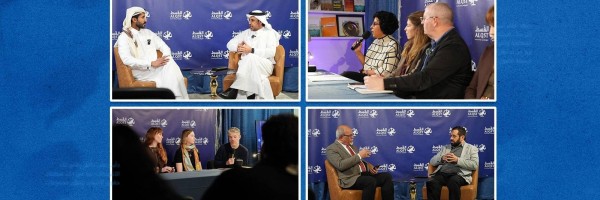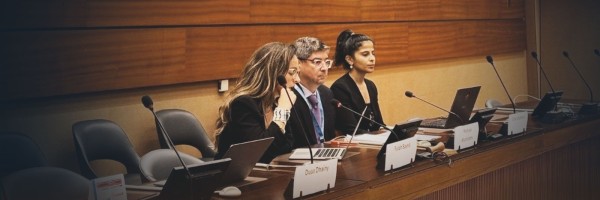On 8 December 2023, ALQST’s traditional Human Rights Day Conference, having examined the latest situation in Saudi Arabia and the wider Gulf region, explored the theme of “Pursuing avenues of accountability in a climate of repression”. The conference heard expert speakers from Amnesty International, MENA Rights Group, Salam for Democracy and Human Rights, The Omani Centre for Human Rights, FairSquare, The Freedom Initiative and NUFC Fans Against Sportswashing. In light of the horrific events unfolding in the region, moderators and speakers throughout the conference expressed solidarity with the people of Palestine.
Here are some of the highlights of the day:
Session 1: Repression rages: Taking stock of the human rights situation in Saudi Arabia (moderated by ALQST’s Deputy Director, Joshua Cooper)
Dana Ahmed, Middle East Researcher at Amnesty International, noted the significant recent increase in crackdowns on freedom of expression, especially through use of the Counter-Terrorism and Anti-Cybercrime Laws. She highlighted ongoing violations, such as the use of travel bans, against human rights defenders who have been released from prison. Ahmed drew particular attention to the death sentence passed on Mohammed al-Ghamdi solely for peaceful expression online, an alarming escalation in the country’s use of the death penalty. Since Saudi Arabia's last Universal Periodic Review (UPR), in 2018, the Saudi authorities have executed over 550 people. Ahmed closed by talking about issues with Saudi Arabia’s Personal Status Law: Amnesty International’s research has revealed that while it is hoped that the law will reduce discrepancies in judges’ rulings on cases of personal status, it still perpetuates the male guardianship system, which the authorities had promised to dismantle completely.
Falah Sayed, Human Rights Officer at MENA Rights Group, provided context on the complete lack of civic space in Saudi Arabia. One of the biggest problems in this regard, she explained, is the oppressive state security apparatus, which includes the Saudi Human Rights Commission (SHRC). Sayed explained that whilst the HRC’s stated mandate is to protect and promote human rights in Saudi Arabia, its complaints mechanism is completely ineffective. She cited Loujain al-Hathloul and Salma al-Shehab as emblematic cases that illustrate this: in both cases the Commission took no account of their allegations of abuse and in fact actively covered them up. Sayed referenced other cases that the HRC has ignored or covered up, including young men sentenced to death for alleged offences committed as minors. Furthermore, while the HRC has the authority to draft and amend problematic laws, it has instead praised the adoption of such laws and made misleading statements on legislative changes. Sayed noted that despite its complete lack of independence and effectiveness, the Saudi HRC has nevertheless received widespread recognition from states around the world.
Session 2: Shared struggles in the Gulf: Countering whitewashing strategies (moderated by ALQST’s Head of Monitoring and Advocacy, Lina Alhathloul)
Jawad Fairooz, founder and chairman of Salam for Democracy and Human Rights, addressed environmental concerns in the Gulf and governments’ failure to tackle threats to the environment. Despite the claims of all Gulf Cooperation Council (GCC) states to be prioritising tackling climate change, and disregarding the concerted efforts of environmental activists in the region, the authorities have not made any serious effort to counter the impact of environmental degradation. The political systems of the GCC states, Fairooz explained, exist to serve the interests of the ruling royal families, which helps to explain the various investments GCC states have been making in sporting and other events: their aim is to bolster these states’ images and whitewash their human rights records.
Nabhan Alhanshi, founder and chair of the Omani Centre for Human Rights, addressed environmental issues in Oman, including worsening natural disasters and increasing water pollution as a result of petroleum. Civil society, Alhanshi explained, is always closely monitored by the authorities, and has no means of applying meaningful pressure on the Omani authorities to pursue environment-friendly policies. Turning to violations of women’s rights in Oman, Alhanshi said Omani laws do not provide sufficient safeguards; domestic violence against women remains widespread and women continue to be murdered by their husbands and family members while the government has done nothing to tackle this issue. In addition, Omani women remain largely unable to pass their nationality down to their children in the same way as Omani men.
Ebtisam Alseagh, a prominent Bahraini women’s rights defender, told the conference that, despite all the authorities’ reports indicating progress, Bahraini women continue to be deprived of many of their most basic human rights, including the right to pass their nationality on to their children or get passports issued for their children – even in the absence of the father. Institutions set up to promote and protect women’s rights, such as Bahrain’s Higher Council for Women, have so far failed to do so. The Higher Council has not achieved accountability for violations of women’s rights, whether perpetrated by family members or by the Bahraini authorities. Nor has it condemned abuses committed against Bahraini women’s rights defenders – Alseagh herself was subjected to violence, sexual harassment and torture – and has in fact ignored their, testimonies. Furthermore, the wives of prisoners of conscience are denied any form of support from the government. Alsaegh added that the appointment of women to important posts in Bahrain’s parliament has not brought about any positive changes for women.
Session 3: The role of the Public Investment Fund (PIF) in economic diversification and nation-branding (moderated by ALQST’s Executive Director, Julia Legner)
This session began with Célia Le Noé, Project Officer at ALQST, describing human rights issues associated with one of the PIF’s highest-profile projects inside Saudi Arabia, the Neom megacity development. In addition to violations carried out against members of the Huwaitat tribe, as documented in a major report by ALQST, Le Noé raised concerns about the extensive digital surveillance that is due to be implemented in Neom, given the Saudi authorities harsh repression of freedom of expression online. She pointed out that Neom will be built largely by migrant workers, who are still systematically exploited under the kafala sponsorship system, and highlighted some of the worst impacts Neom will have on the environment due to the energy- and water-intensive nature of the desert megacity’s construction and maintenance.
John Hird, one of the founders of NUFC Fans Against Sportswashing (NUFCFAS), spoke about the human rights implications of the PIF’s takeover of Newcastle United Football Club, as well as its potential impact on local democracy in Newcastle itself. He described the steps privately taken by the UK government to ensure the takeover went ahead, and referenced past arguments made by supporters of the takeover that the PIF was a separate entity from the Saudi state, a claim since disproved by ALQST and others. Hird talked about NUFCFAS’s work in highlighting specific cases, such as the nine young men currently at imminent risk of execution in Saudi Arabia, and explained what can be done by fans who oppose the Saudi authorities’ human rights violations. He underlined the importance of grassroots campaigning to effect change, and cited the success of ALQST’s Lina Alhathloul’s recent visit to Newcastle as a prime example. With reference to Saudi Arabia’s hosting of the 2034 World Cup, Hird drew attention to potential violations likely to be perpetrated against migrant workers, recalling similar issues with the 2022 Qatar World Cup.
James Lynch, founding Co-Director of FairSquare, elaborated further on the PIF’s aim. It had started out as a relatively conservative, sovereign wealth fund, but has been transformed under Mohammed bin Salman’s leadership into a much more radical, ambitious, high-risk yet opaque investment vehicle, in parallel with the ongoing consolidation of centralised state power in Saudi Arabia. In addition to projects such as Neom, Lynch spoke about the PIF investing in sports in a bid to change the world’s perception of Saudi Arabia and connect with different demographics, such as the business community, thereby normalising Saudi Arabia as a place to invest and work. He also addressed the fund’s heavy investments in technology, which the authorities have used extensively to suppress dissent, and its intention to directly influence international politics. PIF investment in other states, Lynch argued, provides a buffer against any pushback over Saudi rights violations. He urged foreign businesses working with the PIF to analyse the way in which they are helping to strengthen the repressive architecture of the Saudi state.
Abdullah Alaoudh, Saudi Director at The Freedom Initiative, described the PIF’s complete lack of independence from the Saudi state, explaining that it is headed by Crown Prince Mohammed bin Salman and was created, and can only be dissolved, by royal decree. These facts contradict reassurances the Premier League said it had received before allowing the Newcastle takeover to proceed. Every major decision the PIF makes has to receive the approval of the crown prince. Alaoudh referred to a Saudi state television interview in which the PIF’s Governor, Yassir Al-Ramayyan, revealed that even majority decisions of the PIF Board can be overruled by the king if its chair, the crown prince, does not agree with them. Alaoudh also discussed criminal activity by the PIF – for instance, its ownership of two private planes that transported Jamal Khashoggi’s assassins to Istanbul – and its efforts to influence international politics, particularly in the United States. A US congressional investigation led by the Blumenthal Commission is also looking into whether the PIF’s majority ownership of PGA golf tours will affect local elections in the United States.
Session 4: Mobilisation of activists in the diaspora (moderated by ALQST’s Monitoring and Campaigns Officer, Abdullah Aljuraywi)
This final session of the conference addressed the experiences of Saudi activists operating in the diaspora, and explored the avenues for effecting progressive change in Saudi Arabia from outside the country. Yahya Assiri, a leading Saudi human rights defender and founder of ALQST, emphasised that the complete lack of civic space in Saudi Arabia makes it impossible for human rights activists to operate there. The dominance of the official narrative prevents people from being able to engage with views that express dissent towards, or criticism of, the Saudi authorities and royal family, who control all aspects of Saudi society, including the judicial and education systems. Assiri explained how religion is used to demonise those who peacefully voice dissent against the Saudi authorities: such people are portrayed by the authorities as waging war against Islam and Muslims. Assiri also spoke, however, about the many successes of ALQST, and congratulated the organisation for having achieved a significant turning point in human rights awareness among the Saudi public. He also stressed the importance of continuing to make organised collective efforts to promote and protect human rights in Saudi Arabia, despite the significant obstacles. Without the work of groups such ALQST and its partners, he believed, the situation in the country would be significantly worse.
Fouz Al-Otaibi, a social media activist and the sister of Manahel and Maryam Al-Otaibi, narrated the story of Manahel Al-Otaibi's arrest and the struggles of her sister Maryam, who has faced an unofficial travel ban since 2017/18. Fouz explained that despite Maryam's efforts to respectfully communicate with the Saudi authorities to obtain a resolution, exhausting all available channels, she received no response or support from them and was therefore forced to resort to speaking out on social media. She (Maryam) had subsequently received a four-month prison sentence and a fine of 100,000 Saudi riyals for publicly discussing her travel ban. Fouz described her attempts to support her sisters by various means, given that she currently resides outside Saudi Arabia. She is the only one of the three sisters who has managed to seek asylum in the UK, where she is sharing her family's story with the world.
ALQST would like to thank the panellists and those who attended in person and online for their participation and continued support.




